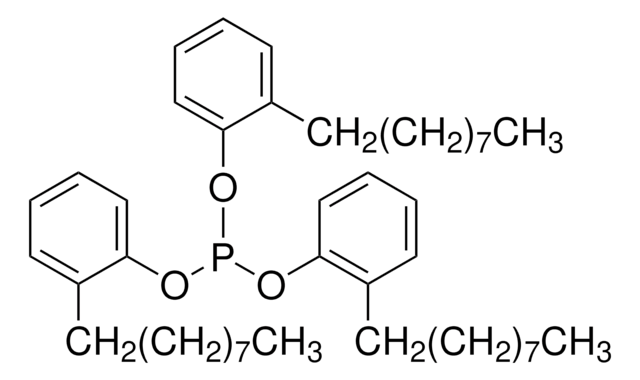32957
Cresyl diphenyl phosphate
PESTANAL®, analytical standard
Sinónimos:
Diphenyl cresyl phosphate, Kresyldiphenylphosphat
About This Item
Productos recomendados
grado
analytical standard
descripción
mixture of isomers
Línea del producto
PESTANAL®
caducidad
limited shelf life, expiry date on the label
técnicas
HPLC: suitable
gas chromatography (GC): suitable
aplicaciones
agriculture
environmental
formato
neat
cadena SMILES
Cc1cccc(OP(=O)(Oc2ccccc2)Oc3ccccc3)c1
InChI
1S/C19H17O4P/c1-16-9-8-14-19(15-16)23-24(20,21-17-10-4-2-5-11-17)22-18-12-6-3-7-13-18/h2-15H,1H3
Clave InChI
FJKVRVFGUXMMAO-UHFFFAOYSA-N
¿Está buscando productos similares? Visita Guía de comparación de productos
Aplicación
Información legal
Palabra de señalización
Warning
Frases de peligro
Consejos de prudencia
Clasificaciones de peligro
Acute Tox. 4 Oral - Aquatic Acute 1 - Aquatic Chronic 1
Código de clase de almacenamiento
10 - Combustible liquids
Clase de riesgo para el agua (WGK)
WGK 2
Punto de inflamabilidad (°F)
464.0 °F - open cup
Punto de inflamabilidad (°C)
240 °C - open cup
Equipo de protección personal
Eyeshields, Faceshields, Gloves
Elija entre una de las versiones más recientes:
¿Ya tiene este producto?
Encuentre la documentación para los productos que ha comprado recientemente en la Biblioteca de documentos.
Nuestro equipo de científicos tiene experiencia en todas las áreas de investigación: Ciencias de la vida, Ciencia de los materiales, Síntesis química, Cromatografía, Analítica y muchas otras.
Póngase en contacto con el Servicio técnico









